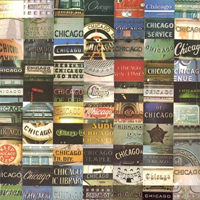Background
Following the poor reception of 1980's Chicago XIV , Columbia Records dropped Chicago from its roster and cancelled a lucrative contract that had recently been signed. While the band had begun its association with David Foster and was in the process of building a new identity, Columbia had contractual obligations for a new release. Therefore, the label wanted a sequel to the band's first, and highly successful, hits package which had been 1975's Chicago IX: Chicago's Greatest Hits . This sequel, Volume II, featured bare-bones album artwork consisting of a collage of photos from around the city of Chicago. The album lacked liner notes and was the only Chicago album not to have its own rendition of the band's distinctive logo; a small picture of the logo from the band's second album appears in the center of the collage.
Released in November 1981, Greatest Hits, Volume II primarily sampled material from Chicago VIII through 1978's Hot Streets, after which the hits stopped coming, though it also stretches back to pick up overlooked hits from the era first covered by the original compilation album. Appearing just before Chicago's unexpected career revival with Chicago 16, it reached number 171 in the US.
This page is based on this
Wikipedia article Text is available under the
CC BY-SA 4.0 license; additional terms may apply.
Images, videos and audio are available under their respective licenses.
